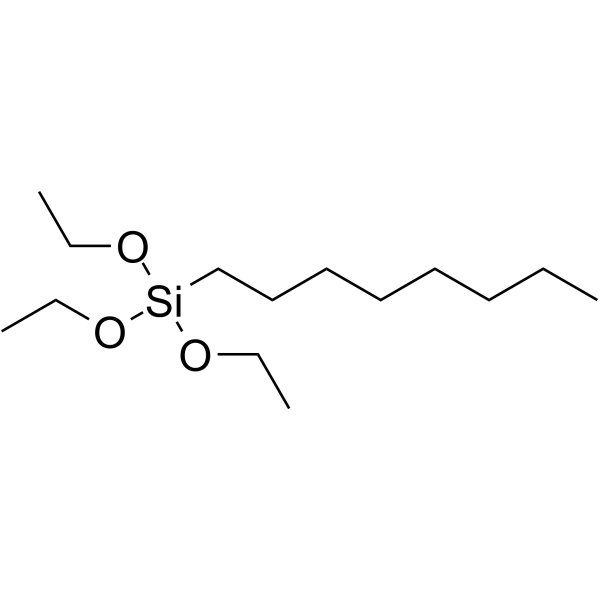
Triethoxyoctylsilane
CAS No. 2943-75-1
Triethoxyoctylsilane( Triethoxycaprylylsilane | Triethoxycaprylylsilane | Oleth-30 | NSC 42964 )
Catalog No. M27141 CAS No. 2943-75-1
Triethoxycaprylylsilane is an organically modified silane that has been found to aggregate in the form of normal micelles as well as reverse micelles.
Purity : >98% (HPLC)
 COA
COA
 Datasheet
Datasheet
 HNMR
HNMR
 HPLC
HPLC
 MSDS
MSDS
 Handing Instructions
Handing Instructions
| Size | Price / USD | Stock | Quantity |
| 1G | 37 | In Stock |


|
Biological Information
-
Product NameTriethoxyoctylsilane
-
NoteResearch use only, not for human use.
-
Brief DescriptionTriethoxycaprylylsilane is an organically modified silane that has been found to aggregate in the form of normal micelles as well as reverse micelles.
-
DescriptionTriethoxycaprylylsilane is an organically modified silane that has been found to aggregate in the form of normal micelles as well as reverse micelles. Triethoxycaprylylsilane is commonly used in plastic applications.
-
In Vitro——
-
In Vivo——
-
SynonymsTriethoxycaprylylsilane | Triethoxycaprylylsilane | Oleth-30 | NSC 42964
-
PathwayOthers
-
TargetOther Targets
-
RecptorTLR7/8/9
-
Research Area——
-
Indication——
Chemical Information
-
CAS Number2943-75-1
-
Formula Weight276.492
-
Molecular FormulaC14H32O3Si
-
Purity>98% (HPLC)
-
SolubilityIn Vitro:?DMSO : 10 mg/mL (36.17 mM)
-
SMILESCCCCCCCC[Si](OCC)(OCC)OCC
-
Chemical Name——
Shipping & Storage Information
-
Storage(-20℃)
-
ShippingWith Ice Pack
-
Stability≥ 2 years
Reference
1.Mussari CP, et al. Discovery of Potent and Orally Bioavailable Small Molecule Antagonists of Toll-like Receptors 7/8/9 (TLR7/8/9). ACS Med Chem Lett. 2020 Jul 29;11(9):1751-1758.
molnova catalog



related products
-
Filorexant
Filorexant is an orally bioavailable effective and selective reversible antagonist of OX1 and OX2 receptor with (Ki <3 nM).
-
GLN-1062
GLN-1062 is a pro-drug of galantamine and liberates galantamine on cleavage by a carboxyesterase in the brain.
-
Deacetyl asperulosid...
Ddeacetyl asperulosidic acid methyl ester is a natual product isolated from the herbs of Hedyotis diffusa Willdit can lower the blood glucose level in normal mice.



 Cart
Cart
 sales@molnova.com
sales@molnova.com


